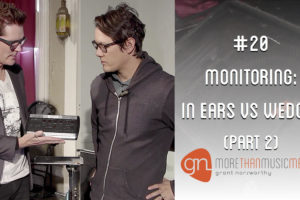Grant spoke with Dominic Schryvers from The Stations and the Gregorian Chat YouTube Channel about…
M3 VIDEO #7 – DRUMS: KEEPING SOLID TIME
By Grant Norsworthy
Watch this short video. To understand the thought process behind the teaching video, read the blog post below it.
In my earlier years of playing bass guitar in bands, I worked with my fellow musicians for countless rehearsal hours to try to get our songs to be, what we called, “tight”. We were “tight” when we assessed that our playing was really together – landing all our notes precisely in time with one another.
In my mind at the time, some of those bands were tight. But then in my first recording session, my best-rehearsed, “tightest” band and I were asked to play with a “click” – an electronically produced metronome that showed us where perfect time really was. It was a rude, shocking awakening for all of us. We were WAY off. We were not tight. We were in fact, as the engineer informed us with bemused resignation, “As loose as a goose!”. Our attempts at recording – transposed over the correctly timed click – proved it.
We were rushing (pushing earlier than the beat) for every accent, every increase in dynamics, during every drum fill. And every time we rushed, we rushed at slightly different rates. We thought we were tight, but we were sloppy. Before then we had no idea!
I realized that adrenaline can do strange things to my sense of time. Sometimes my internal metronome lies to me.
Unconscious Incompetence:
– When I don’t know what I don’t know.
– Or thinking that I know something, when I actually don’t.
From that moment, I realized that I needed to train my internal metronome to have a better sense of time. I had to practice with a metronome and with professionally recorded (metronome perfect) songs. And perhaps most importantly, I had to play with drummers who were training their sense of time. No matter how good the timing is from other band members, if the drums are out of time,it’s all out of time.
Hey, not all music needs to be in metronome-perfect, constant time. Some of my favorite music goes through shifts in the lengths of the beats – sometimes very obviously and other times more subtly. But to improve the sound of our guitar/drum driven Church bands we must improve our time-keeping ability.
Music sounds better when it’s played in time. Congregations will feel more confident to engage if the leading musicians are together and timing the music well. There may not be many people in your Church congregation who would be consciously aware when the band is not keeping good time – with a better internal metronome than the musicians – but poorly timed music puts people on edge, does not invite, can hinder people’s ability and willingness to sing along.
In any vocal/guitar/keys/bass/drums band, time is established by the drums. In my mind, the drummer is the modern-ensemble’s conductor. It’s up to the drummer to make sure the band knows where correct time is. While it’s important that all musicians improve their sense of correct time, it’s even more important that drummers do. All drummers should utilize a metronome. This can be done in one of three ways:
- Use headphones from an electronic metronome for focused, personal practice.
- Use that same metronome set-up while you’re playing with the band.
- If your band is using in-ear monitoring, arrange for your metronome’s click to be fed to the other musicians too. (Note: A metronome click through open speaker monitors will be a terrible, unmusical distraction).
This might surprise you: My ideal is that the band should NOT use a metronome – a click – while we are rehearsing or engaging a congregation -not even just for the drummer. But that ideal band will need to have each member – especially the drummer – with well trained internal metronomes.
Why?
- I want the freedom to have subtle, intentional time changes in our songs.
- I do not want to have to wear in-ear monitors as they make it very difficult for me to connect and assess the congregation’s singing.
- I want to be able to have different instruments in the band play sections of the song without the need for constant time keeping from a drummer.
- I want introductions to songs that do not need to wait for the drummer to reset and switch on the metronome.
In a live music situation – especially leading a Church congregation to worship God through songs – I would rather not lean on the robotic, perfect time of electronics. I believe the human sense of time, when well disciplined and trained, is best. But until we have that, let’s use the metronome and never assume that out internal sense of time is perfectly correct.
The video above is #7 in the More Than Music Mentor training resource series. In it I speak with drummer Jonathan Truman about the importance of training our internal metronome and keeping solid time, and the different ways a drummer can use a metronome’s “click” to establish and keep better time for the whole band.
Watch Video#7 – Drums: Keeping Solid Time again.
For more free resource videos and info, visit www.MoreThanMusicMentor.com.


